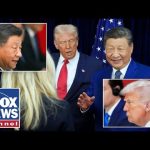In a whirlwind of diplomatic activity, Treasury Secretary Scott Bessent recently represented the United States at the APEC conference in South Korea. Highlighted as a critical moment in President Trump’s administration, this event showcased a series of significant trade deals, positioning America firmly on the world stage. Secretary Bessent noted that the Trump administration has been making substantial moves to solidify relationships with Asia, countering the ongoing narrative that China is prevailing in the trade war.
During the conference, Secretary Bessent rolled out the accomplishments of the Trump administration, including historic trade deals with Japan and various agreements in Southeast Asia. The Secretary pointed out that tariffs on American products in Japan have dropped to nearly zero, leading to an impressive influx of investments back into the U.S. from Japan. Instead of backing down, President Trump is facing China head-on in its own backyard, making these advancements a vital part of the administration’s long-term strategy.
However, some globalist critics are claiming that China is coming out ahead in this trade tussle. Reports suggest that China’s withholding of soybean purchases and rare-earth exports is a tactical move to leverage its position with the U.S. Nevertheless, Bessent provided a strong rebuttal to these accusations, asserting that the respect President Xi shows for Trump reflects the strength of their working relationship. Those doubting the impact of these meetings might just be suffering from what is termed “Trump Derangement Syndrome,” according to Bessent.
Bessent was quick to emphasize that the Trump administration is keen on establishing independence from China in several critical industries, including rare-earth elements and semiconductors. He pointed out that this isn’t a rapid process and that the American reliance on China has developed over decades. Yet, with a calculated shift over the next few years, he expressed optimism about the nation’s potential to build a self-sustaining economy without having to rely excessively on a communist regime for vital resources.
Despite the positive momentum, challenges remain at home. The ongoing government shutdown is a significant concern, with both workers and citizens feeling the squeeze. Bessent expressed urgency in reaching a bipartisan agreement to reopen the government, assuring that military personnel would get paid soon. His focus turned to the need for Democratic senators to join in the effort to avoid further economic complications, particularly as the holiday season approaches, traditionally marked by heavy travel and family gatherings.
In summary, Secretary Bessent’s presence at APEC represents a crucial chapter in American foreign policy, as President Trump strives to push U.S. interests forward and stabilize trade ties. While hurdles abound, including criticism from Democratic leaders and the threat of a government shutdown, hope remains that the administration can navigate the treacherous waters of global politics, ultimately emerging stronger. It’s an all-hands-on-deck moment for America, and with strong leadership, the nation may continue to reverse years of economic dependency on rival powers.




